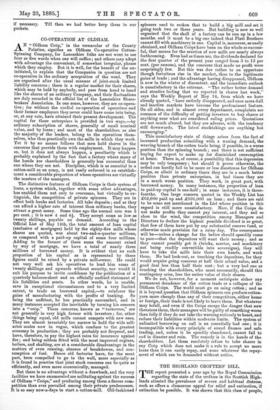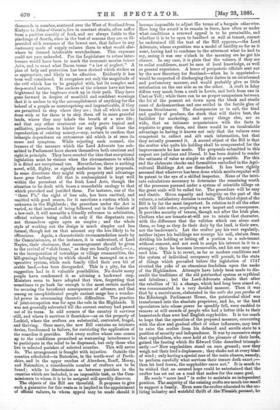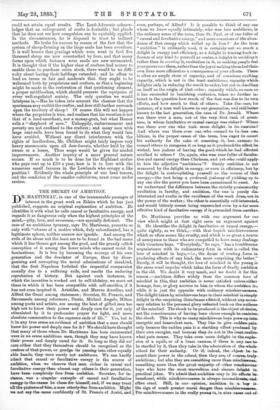THE HIGHLAND CROFTERS' BILL. THE HIGHLAND CROFTERS' BILL.
THE report presented a year ago by the Royal Commission regarding the state of the crofters in the Scottish Highlands attested the prevalence of severe and habitual distress, such as offers a clamorous appeal for relief and extinction, if extinction be possible. It was shown that this class of people, thousands in numbers scattered over the West of Scotland from Kintyre to John-o'-Groat's, live in constant straits, often suffer from a positive scarcity of food, and are always liable to the pinchings of dearth, since in the best of seasons they are so illprovided with resources of the lowest sort, that failure in any customary mode of supply reduces them to what would elsewhere be deemed intolerable wretchedness. This exposure could not pass unheeded. For the Legislature to refuse interference would have been to mock the economic maxim hisser faire, and to enact what Bacon terms "a law of neglect." A plan of help and protection has been devised which strikes us as appropriate, and likely to be effective. Evidently it has been well considered. It recognises not only the magnitude of the evil which has to be grappled with, but its complex and deep-seated nature. The authors of the scheme have not been frightened by the bugbears stuck up in their path. They have gone forward in despite of manifold and confident warnings that it is useless to try the accomplishment of anything for the behoof of a people so unenterprising and impracticable, if they are permitted to stop where they are ; that all which can be done with or for them is to ship them off to more grateful lands, where they may inhale the breath of a new life ; and that any other treatment can only prove topical and palliative, powerless to hinder for any length of time the reproduction of existing misery,—nay, certain to confirm that lethargic dependence on extraneous aid which is at once its cause and symptom. While rejecting such counsel, the framers of the measure which the Lord Advocate has submitted to Parliament have shown themselves both cautious and right in principle. They have scouted the idea that exceptional legislation must be vicious when the circumstances to which it is fitted are exceptional too. Nevertheless, there is nothing novel, wild, flighty, or signally audacious in their proposals. In some directions they might with propriety and advantage have gone further. All that is contemplated is kept well within the precedent of the Irish Land Acts, though the situation to be dealt with bears a remarkable analogy to that which provoked and justified them. For instance, one of the "Three F's," the right of free sale, has been omitted, and ‘omitted with good reason, for it sanctions a custom which is unknown in the Highlands ; the procedure under the Act is varied, so that instead of being followed out in the fashion of a law-suit, it will resemble a friendly reference to arbitration, official valuers being called in only if the disputants cannot themselves agree upon an umpire ; and the whole style of working out the design is much simpler and less formal, though not on that account any the less likely to be efficacious. Again, a characteristic recommendation made by 'the Commissioners, at the instance, it is understood, of Lord Napier, their chairman, that encouragement should be given to the revival of "club farms," as they are locally called,—i.e., to the incorporation of townships or village communities, the hill-grazings belonging to which should be managed on a cooperative system, while each family tilled their own bit of arable land,—has been disregarded. This is a pity, for the suggestion had in it valuable possibilities. No doubt many people have condemned it as advising a backward step. Ministers seem to have adopted that view, forgetting that sometimes to go back far enough is the most certain method for securing the beneficent consequences of advance, and that among an unsophisticated people ancient usage has a wonderful power in overcoming theoretic difficulties. The practice of joint-occupation was for ages the rule in the Highlands. It was not generally subverted till the current century had passed out of its teens. In odd corners of the country it survives and where it survives it flourishes—as on the property of • Loehiel, where the crofters are substantial, contented, frugal, and thriving. Once more, the new Bill contains an intricate device, foredoomed to failure, for restricting the application of the remedies it provides. Not every crofter whose case comes op -to the conditions prescribed as warranting interference is to participate in the relief to be dispensed, but only those who live in selected parishes of selected counties. This will never do. The arrangement is fraught with injustice. Outside the counties scheduled—in Buteshire, in the north-west of Perthshire, and in the upper reaches of Aberdeen, Banff, Moray, and Nairnshire, a considerable number of crofters are to be found ; while to discriminate as between parishes in the counties which are included, is an impossible task, as the Commissioners to whom it is to be assigned •will speedily discover. The objects of the Bill are threefold. Itproposes to give such a guarantee for fair rents as is implied in the appointment of official valuers, to whom appeal may be made should it become impossible to adjust the terms of a bargain otherwise. How long the award is to remain in force, how often or under what conditions a renewed appeal is to be permissible, and whether it is to be open to landlord as well as tenant, cannot be understood till the text of the Bill appears,—the Lord Advocate, whose exposition •was a model of lucidity so far as it went, having had to condense to the uttermost what he had to say, seeing it was one o'clock in the morning ere he got his chance. In any case, it is plain that the valuers, if they are to enlist confidence, must be men of local knowledge, as well as general experience. A brace of peripatetic officials sent out by the new Secretary for Scotland—when he is appointed— would be suspected of discharging their duties in an uninformed and perfunctory manner, and would probably give as little satisfaction on the one side as on the other. A croft in Islay differs very much from a croft in Lewis, and both from one in 'Mist or Yell ; while there can be no proper comparison between the lot of the peasant set down upon the bleak and sterile coast of Ardnamurchan and one settled in the fertile glen of famous Strathnaver. The discrepancies as to soil, the kind and quality of produce, the stock that will thrive best, the facilities for marketing, and many things else, are so wide, that an intimate acquaintance with the facts is requisite to grasp them, •and there would be an incalculable advantage in having it known not only that the valuers were competent to collect and sift such information, but that they actually possessed it. A second object of the Bill is that the crofter who quits his holding shall be compensated for the improvements he has made. The proposals submitted in this respect are judicious and liberal. It has been desired to render the estimate of value as simple an affair as possible. For this end the elaborate checks and formalities embodied in the Agricultural Holdings Act are discarded. It has been rightly assumed that whatever has been done which merits requital -will be patent to the eye of it,skilled inspector. None of the intricate calculations necessary to determine the remaining worth of the processes pursued under a system of scientific tillage on the great scale will be called for. The procedure will be easy and elastic. Given capacity and integrity on the part of the valuers, a satisfactory decision is certain. The third object of the Bill is by far the most important. In relation to it all the other parts fall into order, acquiring a new import and consequence. It provides security of tenure, though not after the Irish plan. Crofters who are tenants-at-will are to retain that character, with the difference that the volition which can alone cast them, so long as they do their duty by the land, is their own, not the landowner's. Let the crofter pay his rent regularly, neither injure his buildings nor scourge his soil, abstain from dividing his holding or letting off a portion to a sub-tenant without consent, and not seek to assign his interest in it to a stranger ; then he becomes irremovable, and his son may succeed him. This is to revert, as far as modern conditions -and the system of individual occupancy will permit, to the state of things which prevailed before the legislation of 1747 rivetted the yoke of an obnoxious feudalism upon the necks of the Highlanders. Attempts have lately been made to discredit the traditions of the old patriarchal system as mythical and fabulous ; but the Lord-Advocate admits that after the rebellion of '45 a change, which had long been aimed at, was consummated in a very decided manner. Then it was that by a contrivance, elaborated in the salle des pas perdus of the Edinburgh Parliament House, the patriarchal chief was transformed into the absolute proprietor, and he, or the land speculators into whose power he speedily fell, were enabled to remove at will crowds of people who had a better title to their homesteads than ever had English copyholder. It is too much to hope that the operation of the proposed measure, concurring with the slow and gradual effect of other influences, may tend to raise the crofter from his debased and servile state to a position of security and independence. It'was by successive steps that copyholders, who once held at the pleasure of their lords, gained the footing which Sir Edward Coke described triumphantly :—" Now copyholders stand on sure ground ; now they weigh not their lord's displeasure ; they shake not at every blast of wind ; only having a special care of the main chance, namely, to perform carefully what services their tenure doth exact ;— then let lord frown, the copyholder cares not." It is much to be wished that an assured hope could be entertained that'the crofter has set out on a road that makes for the same goal.
He needs " more land " in order to maintain an independent position. The majority of the existing crofts are much too .small to support a family. Even were the crofter educated to the-untiring industry and watchful thrift of .the•Flemish peasant, he could not attain, equal results. The Lord-Advocate acknowledges that an enlargement of crofts is desirable ; but pleads that he does not see how compulsion can be equitably applied. In the circumstances, he is disposed to trust to indirect methods. He looks for success by reason of the fact that the system of sheep-farming on the large scale has been overdone. It is well known that grazings -which were wont to feed five thousand sheep are now overstocked by four, and that many farms upon which fortunes were made are now untenanted. It is thought that if the higher class of crofters had money to enable them to purchase extra stock, there would be no difficalty. about having their holdings extended ; and he offers to lend onterms so fair and moderate that they ought to be welcomed both• by proprietors• and crofters, so that a beginning might bemade in the restoration of that quickening element, a proper• middle-class, which should preserve the equipoise of every well-regulated society. The only question we would interpose is,—Has he taken into account the chances that the sportsman may outbid the crofter, and deer still further encroach upon the territory of sheep ? Of course this will not happen where• the prcprietor is wise, and realises that his vocation is, not that of a land-merchant, nor a money-grub, but what Homer calls a " shepherd of men." Unhappily, embarrassment and poverty are not confined to the crofters.; and many men with large rent-rolls have been forced to do what they would fain have avoided. Without any direct interference with the rights of landlordism, Mr. Childers might fairly impose very heavy assessments upon all deer-forests, whether held by the owner or a lessee. Thus scope would be given for needed improvements. Another inquiry of a more general nature occurs. If so much is to be done for the Highland crofter who pays rent up to £30 a year, how is it to fare with the numerous small farmers in the Lowlands who occupy a like position ? Evidently the whole principle of our land tenure, and the condition of the smaller cultivators, must come under reviews




































 Previous page
Previous page